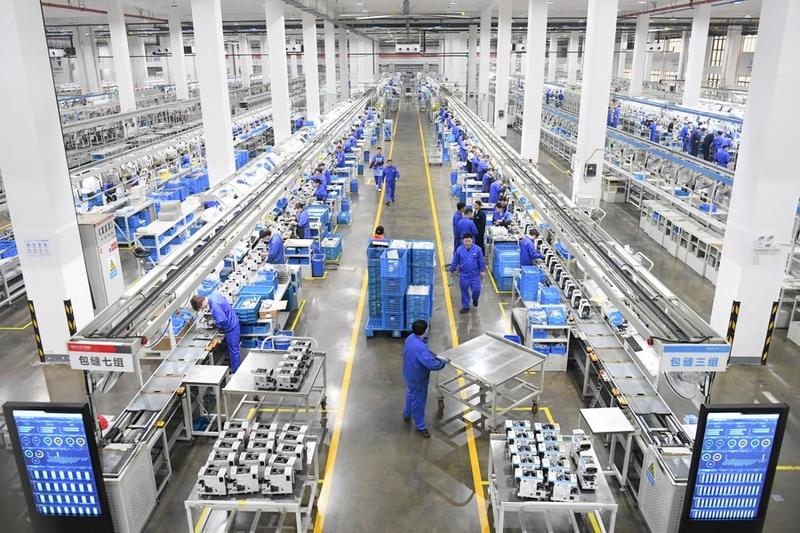 Workers work at a workshop of Jack Sewing Machine Co., Ltd. in Taizhou, East China's Zhejiang province, March 23, 2023. [Photo/Xinhua]
Workers work at a workshop of Jack Sewing Machine Co., Ltd. in Taizhou, East China's Zhejiang province, March 23, 2023. [Photo/Xinhua]
The post-pandemic recovery of the economy is not as strong as expected. Compared with the previous quarter, the economy surged 2.2 percent in the first quarter this year, and only 0.8 percent in the second — while all the three growth drivers — foreign trade, investment and consumption — are confronting mounting structural and systemic pressures.
The headwinds have further highlighted the importance of private enterprises to the national economy, as they are the major job creators, taxpayers and innovators. As of the end of last year, 93.3 percent of the overall number of business entities in the country were private enterprises. They created 48.3 percent of the jobs nationwide and accounted for 50.9 percent of China's exports.
It is fair to say that the private sector is a key force for the country's modernization, a foundation for its high-quality development and an indispensable booster of the nation's comprehensive strength. With this in mind, the central authorities rolled out 31 policy measures on Wednesday to make the private economy "bigger, better and stronger".
These measures should instill confidence among the 118 million individual businesses and 50 million private enterprises in the country that the authorities are providing assistance to help them pass the test of this trying moment. All the measures, including improving the business environment, protection for the property rights of private firms and entrepreneurs and steps to ensure fair market competition by breaking down market-entry barriers, are responses to the prevailing concerns voiced by entrepreneurs. There are also specific requirements and policy recommendations for the implementation of the measures so that governments at various levels waste no time in translating the measures into concrete actions that produce tangible benefits for local private enterprises.
That being said, the effectiveness of the measures still depends on whether the grassroots governments can faithfully carry out these measures, especially at a time when they also face great financial difficulties themselves. It is an indisputable fact that the private enterprises in some regions are still the victims of excessive rubber stamps, discriminatory financing, irrational market barriers, the malpractices of watchdog departments, and high fees and taxes.
The growth rate of China's private investment has declined continuously, from 8.4 percent in March 2022 to 0.4 percent in April 2023, a direct reflection of the entrepreneurs' judgement of the situation.
The impacts of the COVID-19 pandemic and the worsening external development environment cannot be ignored. How to create a policy environment to help protect the private enterprises from these influences, and put them in a better position in the "dual-circulation paradigm" that is being formed in the national economy will be a test of the efficacy of the latest basket of pro-business measures.


